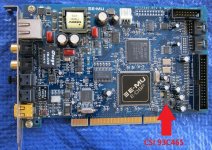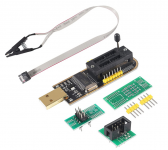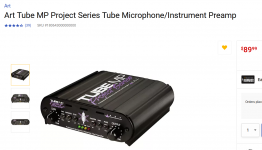That's exactly what I did. I have roughly 10 different ones so far and the more expensive ones definitely aren't my favorites.
I use a lot of op amps in my designs both audio and "other".
I tend to just spec them on requirements rather than sound.
For a low bandwidth oscilloscope I would look for 10Mhz bandwidth and a good slew rate and RRIO and through hole. This usually ends up with a choice of 2 or 3, probably 2 of which are now obsolete.
So I usually end up chasing around for obsolete parts.
I tend to just spec them on requirements rather than sound.
For a low bandwidth oscilloscope I would look for 10Mhz bandwidth and a good slew rate and RRIO and through hole. This usually ends up with a choice of 2 or 3, probably 2 of which are now obsolete.
So I usually end up chasing around for obsolete parts.
By using only through hole devices you limit the selection of opamps pretty much.
A 'good' RRIO device is an OP1678/1679 but it is only available as SMD and has no superior values like an AD797 and such.
A 'good' RRIO device is an OP1678/1679 but it is only available as SMD and has no superior values like an AD797 and such.
Hello,
I'm looking for an op amp to put in a project of an audio switcher.
My main audio source is my laptop headphones out (so, nothing audiophile here). Just need to be easy to use (low to none external components) and to drive (VCC of about 5V or less) and also easy to get (of eBay or sampling from the manufacturer).
It can be DIP or anything else because I'm gonna order the PCBs designed by me and get help to solder the smaller components (i have other ICs with 3x3mm).
What can you recomend me?
Thank you very much
I'm looking for an op amp to put in a project of an audio switcher.
My main audio source is my laptop headphones out (so, nothing audiophile here). Just need to be easy to use (low to none external components) and to drive (VCC of about 5V or less) and also easy to get (of eBay or sampling from the manufacturer).
It can be DIP or anything else because I'm gonna order the PCBs designed by me and get help to solder the smaller components (i have other ICs with 3x3mm).
What can you recomend me?
Thank you very much
Well, IMO, nothing better than Puccini Pavarotti Scala di Milano series by Ottonelli Superecliptic---which uses a pure 50/50 mixture of Esther and Carbonate. They are handcrafted by the Dalai Lama himself on February the 29th nights only, have 720 degree increased soundstage, better black noise granularity, Boltzmann Quantic reproduction on strings and deep creamy espresso foam smoothness on vocals. AND they need NO external components, not even a power supply!
he is joking about your requirements. I would recommend TS922, al low-cost, low-voltage dual opamp from STM.
eX Radikal — this is the absolute very best advice about opamps for audio;
Also please try to smile a bit, the Ottonelli Superecliptic joke is really quite funny... 🙂
Spend two vacuum tubes' worth of money and buy a LOT of opamp chips. Listen to them all. I'll bet the one whose sound you love the most, is not the one whose datasheet is the most eye-poppong.
Also please try to smile a bit, the Ottonelli Superecliptic joke is really quite funny... 🙂
I have start a new thread - go to
Choosing of best sounding OP AMPs for the lowest possible THD+N -really the best Way?
Choosing of best sounding OP AMPs for the lowest possible THD+N -really the best Way?
I just ran a (single) blind listening test where the opamps were sanded, painted, and shipped 1000 miles to the listening room. Experimenter was 1000 miles away when listening took place and indeed didn't even know which week or which days of the week, listening happened.
uA741 finished ahead of ADA4898 (0.9 nV/rt.Hz). Yes really.
Here are both DATASHEET 1 . . . . and DATASHEET 2
_
uA741 finished ahead of ADA4898 (0.9 nV/rt.Hz). Yes really.
Here are both DATASHEET 1 . . . . and DATASHEET 2
_
Last edited:
Yes, well, I think it really depends on the listener.....If you said Bruce Swedien, Shelley Yackus, and Geoff Emerick thought that the 741 sounded better, then it would have some credence. In any case, everybody's ears are different. Some people also think that a cassette tape sounds as good as reel-to-reel. Not me!
It can sound close to Reel to Reel if Cassette is encoded with Dolby S or dBx.
Of Course, Reel to Reel with NR will destroy cassette.
Of Course, Reel to Reel with NR will destroy cassette.
I know there are several E-MU owners in this thread so perhaps one can help me.
I was well underway with repairing my old 1820 and then an Ebay 1820m... ...and then disaster struck. (And I was just about to start swapping op-amps...) My PCI card (EM8810) seems to be no longer recognized and to keep the story short it appears that the 93C46 EEPROM is corrupt. I have removed the EEPROM and it was all "FF". But I can read and write it.
The problem is... ...I need a dump from a 93C46 EEPROM from a working EMU PCI card (EM8810, the one with the Firewire port. Not the newer one without the Firewire port.)
Is there any chance someone out there has the firmware dump or possibly an EEPROM reader and a working card?
Online I found the wrong firmware from someone who had the same corruption problem with the newer (non-firewire card). But that is a different type/length/size EEPROM. (The EM8960 card.)
I know the chances are slim but... ...I am really stuck now. I have repaired 1820 dock, repaired 1820m dock and dead EM8810 PCI card.
I was well underway with repairing my old 1820 and then an Ebay 1820m... ...and then disaster struck. (And I was just about to start swapping op-amps...) My PCI card (EM8810) seems to be no longer recognized and to keep the story short it appears that the 93C46 EEPROM is corrupt. I have removed the EEPROM and it was all "FF". But I can read and write it.
The problem is... ...I need a dump from a 93C46 EEPROM from a working EMU PCI card (EM8810, the one with the Firewire port. Not the newer one without the Firewire port.)
Is there any chance someone out there has the firmware dump or possibly an EEPROM reader and a working card?
Online I found the wrong firmware from someone who had the same corruption problem with the newer (non-firewire card). But that is a different type/length/size EEPROM. (The EM8960 card.)
I know the chances are slim but... ...I am really stuck now. I have repaired 1820 dock, repaired 1820m dock and dead EM8810 PCI card.
Attachments
Yes, good idea. I did that over here: 93C46 EEPROM Corruption on EM8810 E-MU 1820/1820m/1212/1212m PCI Card?Submit your question under a new post. You can call out to people who have this device!
I did eventually reprogram the EEPROM using another EM8810 card but it still does not work. I have not been able to determine what really went wrong with it or how to fix it.
The listeners must have been deaf as well as blind.😛I just ran a (single) blind listening test where the opamps were sanded, painted, and shipped 1000 miles to the listening room. Experimenter was 1000 miles away when listening took place and indeed didn't even know which week or which days of the week, listening happened.
uA741 finished ahead of ADA4898 (0.9 nV/rt.Hz). Yes really. _
Perhaps if you put the attached in the signal chain the listener would say it was even better.
Was the listener listening for the most added distortion and thus "correctly" picked the 741 over the ADA4898? Picked the worst op-amp because it colored the sound the most?
Who was the listener and why do you think they would be suitable for picking op-amps via a listening test? Are they a pro audio engineer and op-amp expert like those who designed and listened to the LM4562 in the National Semi listening room?
Was the listener listening for the most added distortion and thus "correctly" picked the 741 over the ADA4898? Picked the worst op-amp because it colored the sound the most?
Who was the listener and why do you think they would be suitable for picking op-amps via a listening test? Are they a pro audio engineer and op-amp expert like those who designed and listened to the LM4562 in the National Semi listening room?
Attachments
- Home
- Amplifiers
- Chip Amps
- The best sounding audio integrated opamps


